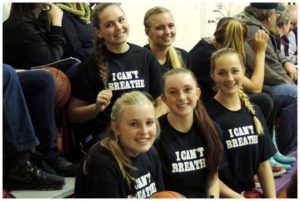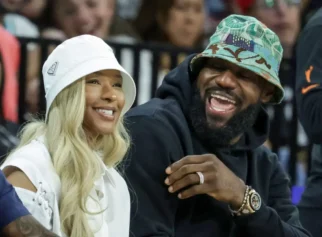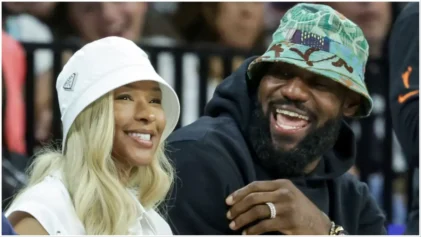
Because they wanted to wear t-shirts that read “I Can’t Breathe” during pre-game warmups, the Mendocino High School boys and girls basketball teams in Northern California had their tournament invitations revoked for what was called “security” reasons.
Principal Rebecca Walker of Ft. Bragg High, site of the tournament, issued a written statement, saying school administrators respected the Mendocino teams “for paying attention to what is going on in the world around them,” but that the t-shirts were being prohibited as a security precaution. And the school district has warned students that they would be ejected from the game if they wore the t-shirts.
How weak.
It is difficult enough to get teenagers to watch the evening news. To get them to pay attention enough to want to make a statement on a critical issue is monumental. At the same time, it stifles their voice to prevent them from the right and urge they possess to enter into the nationwide conversation on a matter that is vital to the nation.
And here’s the clincher: Mendocino and Ft. Bragg High Schools—located 120 miles north of San Francisco in a region known for redwood forests, a rugged coastline and marijuana-growing—are a combined 1 percent Black. One percent. Whites make up 50 percent, Hispanics 41 percent at Fort Bragg; and Mendocino is 75 percent white and 9 percent Hispanic.
Want to eradicate racism? Yes, it’s an improbable notion, but to even begin the process, it has to start with the young. White youths have to see that a white police officer choking to death a man in an attempt to arrest him, as in the Eric Garner case in Staten Island, New York, is wrong. Simple as that.
Racism is a learned behavior. If white teenagers see the injustices and are willing to show they support the end of such tragedies, they are learning to steer away from what they have been taught at home and through various other influential means.
Every civil rights movement in America’s history involved right-thinking, fair-minded people of all races. To squash these kids’ rights of free speech, especially in a case like this, is the kind of institutional racism that has held back the United States and held down Blacks.
Walker, the principal, wrote: “To protect the safety and well-being of all tournament participants it is necessary to ensure that all political statements and or protests are kept away from this tournament. We are a small school district that simply does not have the resources to ensure the safety and well-being of our staff, students and guests at the tournament should someone get upset and choose to act out.”
That’s a cop out. Wearing “I Can’t Breathe” did not create a safety hazard when the girls team first wore the t-shirts before a game with Fort Bragg on Dec. 16, according to their coach, Caedyn Feehan, who added that they wore the t-shirts before two other games with no push back.
Feehan said to the Santa Rosa Press Democrat: “None of the administrators knew . . . that any of them were doing it in advance. This was entirely for their cause that they had strong feelings about it.”
The young players’ actions followed those of Kobe Bryant, LeBron James, Derrick Rose and the many other NBA players and other professional athletes who wore the t-shirts before their games. Some teams preferred the athletics not make their statements with the t-shirts, but the players did not acquiesce and were not in the position the high school players were with having administrators control their ability to perform on the court.
The pressure and desire to play apparently combined to make 10 of 11 boys’ players agree to not wear the t-shirts. They were reinstated to the tournament. The girls held strong, with not enough of them giving in to have the ban lifted.
Conner Woods, 16, is the lone basketball player to not give in. His father, Marc Woods, told the Press Democrat: Banning the youths from wearing the shirts is “a first amendment violation, that’s what he is fired up about.”
On the other kids giving in to the demands, Marc Woods said: “It doesn’t take a lot to suppress the exchange of ideas when you put fear into it.”
It’s more than fear the administrators dished out. They served up the kind of narrow and biased thinking and strong-arm tactics that put the country in this position in the first place. And to think: Their job is to educate the youth.


